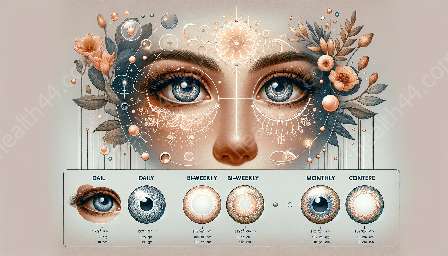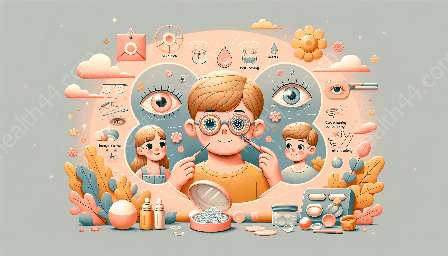Children's vision development is a crucial aspect of their overall growth, and the use of contact lenses can play a significant role in shaping their visual health. In this comprehensive guide, we will explore the impact of contact lens wear on children's vision development, discussing the considerations and effects of contact lenses in children.
Understanding Contact Lens Wear in Children
Contact lenses are a popular alternative to eyeglasses for correcting vision problems in children. They provide clear vision and eliminate the inconvenience of wearing glasses, particularly for physically active children involved in sports and other physical activities.
However, when it comes to children, there are unique considerations that need to be taken into account when prescribing and using contact lenses. Factors such as maturity, responsibility, and proper lens care are vital in determining whether a child is ready for contact lens wear.
The role of optometrists and parents is crucial in ensuring that children understand and adhere to the necessary guidelines for contact lens use, including proper hygiene, appropriate wearing schedules, and regular follow-up appointments.
The Impact of Contact Lens Wear on Children's Vision Development
Research has shown that contact lens wear can have both positive and negative effects on children's vision development. Let's delve into these effects in detail:
1. Visual Acuity and Adaptation
When prescribed and used correctly, contact lenses can provide excellent visual acuity and improved peripheral vision for children. They also offer a natural field of vision, which can enhance visual adaptation, especially in cases where children have refractive errors such as myopia or astigmatism.
However, excessive or improper use of contact lenses can potentially impact visual adaptation and lead to discomfort and reduced visual performance in children.
2. Ocular Health and Risks
Proper contact lens hygiene and compliance with wearing schedules are essential in maintaining ocular health in children. If children fail to adhere to hygiene guidelines or neglect proper lens care, they may be at risk of developing eye infections, inflammation, or corneal complications.
Therefore, it is crucial for parents, educators, and eye care professionals to educate children about the importance of proper lens care and hygiene practices.
3. Self-Esteem and Confidence
For many children, wearing contact lenses can improve their self-esteem and confidence, especially if they feel self-conscious about wearing eyeglasses. Contact lenses can offer a sense of freedom and aesthetic appeal, empowering children to feel more comfortable and confident in their daily activities.
However, it is important to address any concerns or anxieties that children may have about wearing contact lenses and to ensure that they feel supported in their transition from glasses to contact lenses.
Considerations for Contact Lens Use in Children
There are several important considerations to keep in mind when it comes to contact lens wear in children:
- Educational Guidance: Parents and educators should work together to educate children about the responsibilities and proper care associated with contact lens wear.
- Regular Monitoring: Optometrists should conduct regular follow-up appointments to assess the visual and ocular health of children wearing contact lenses.
- Hygiene and Compliance: Emphasizing the importance of proper lens hygiene and compliance with wearing schedules is crucial for preventing ocular complications.
- Emotional Support: Addressing the emotional and psychological aspects of transitioning to contact lenses is essential for ensuring that children feel confident and comfortable in their new visual correction method.
Conclusion
Contact lens wear can significantly impact children's vision development, encompassing both positive and negative effects. By considering the unique needs and challenges of children, along with the appropriate guidance from eye care professionals and parents, contact lenses can be a valuable option for correcting vision in children. It is essential to prioritize ocular health, responsible lens care, and emotional well-being to ensure a positive experience for children incorporating contact lenses into their visual routine.





















